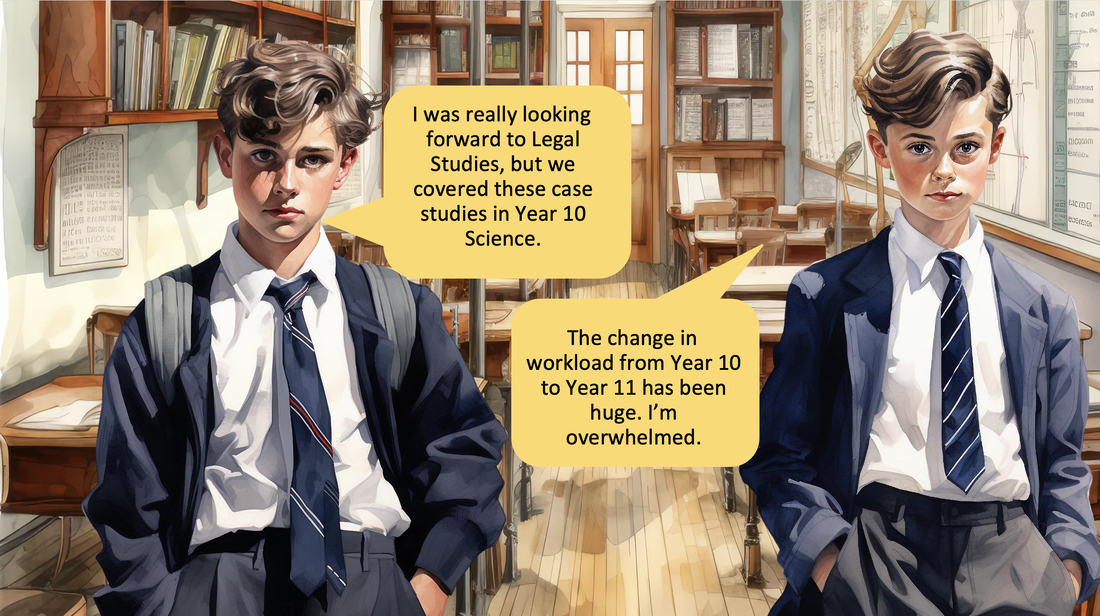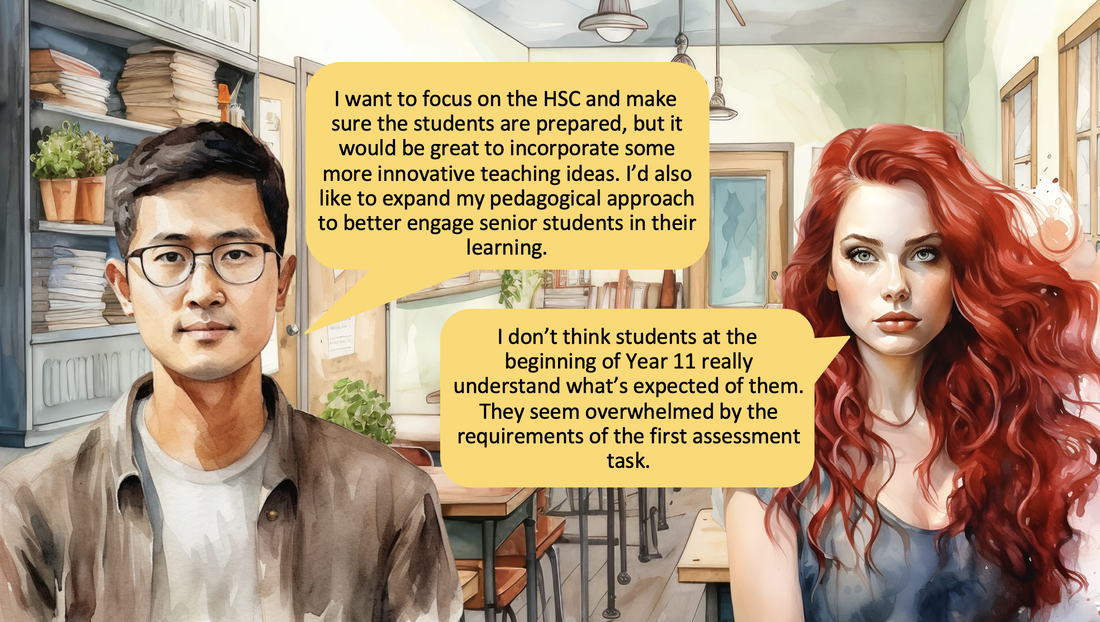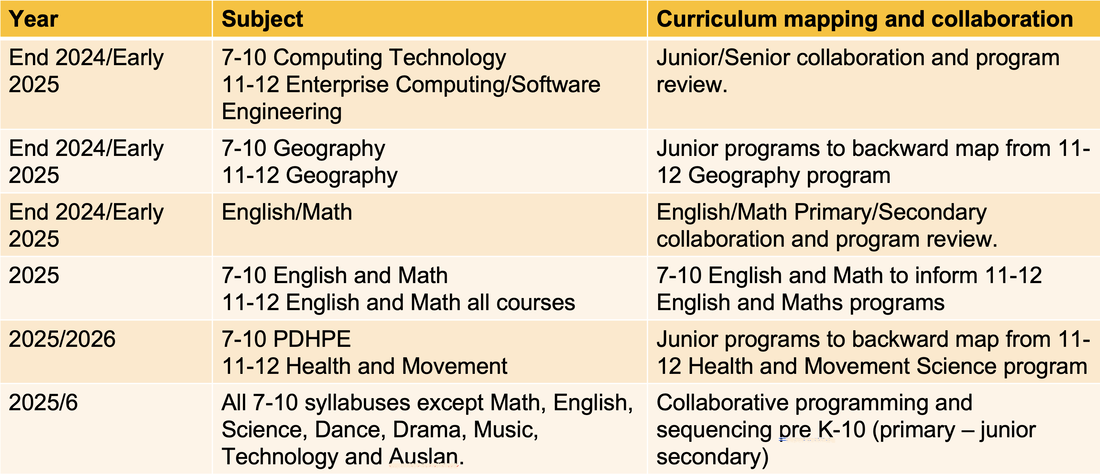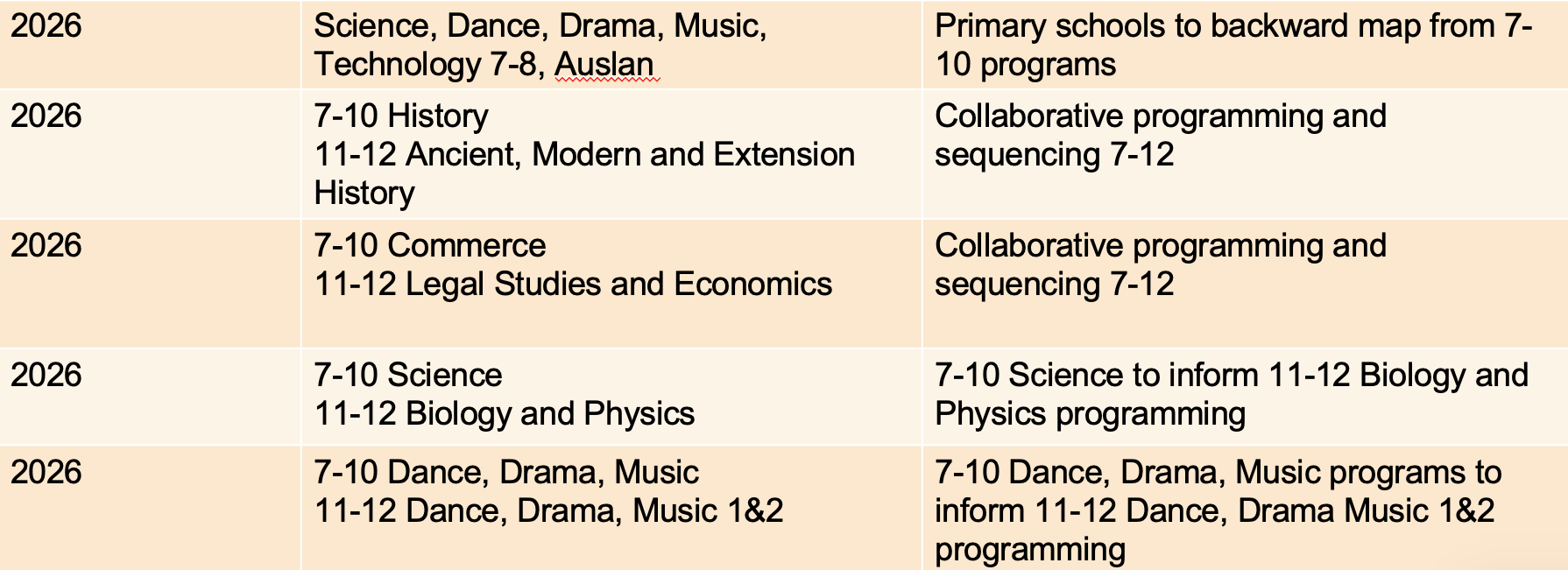|
Just as students transition from primary school to high school, students experience a similar period of transition when moving from junior years to senior years of high school. Often students experience a similar period of anxiety, reassessing organisation structures, and feeling overwhelmed. This transition should be managed in a similar way as the transition from primary to high school and consideration should be given to curriculum sequencing as one measure towards addressing this. Curriculum sequencing to support students transitioning into senior years can include: - curriculum mapping to determine gaps, overlaps and repetition from junior years to senior years. - ensuring a range of teaching strategies are used with seniors to ensure continued engagement in their subjects. - gradually increasing the complexity of assessment tasks and structures from Year 9 to 11 to more closely resemble Stage 6 tasks. Assessment policies should also reflect this. - continuity and increased complexity of school programs that address student literacy and numeracy skills should be ensured. - personalised learning and support provided for individual students should be re-examined and meetings with parents should occur to ensure that families understand the provisions that are allowed in Stage 6. This process should be centralised within the school, not done by individual subject teachers. 7-10 syllabus implementation timeline:
2024 – English and Maths, Aboriginal, Classical and Modern Languages, Computing Technology implemented 2026 – Science, Dance, Drama, Music, Technology 7-8, Auslan implemented 2027 – PDHPE, Geography, History, Aboriginal Studies, Commerce, Visual Arts, Agricultural Tech, Engineering Tech, Marine and Aquaculture Tech implemented 2028 – Photographic Media, Child Studies, PASS, Visual and Motion Design, Work Education, Geography Elective, History Elective Industrial Tech, Design and Tech, Food Tech, Textiles Tech, Graphics Tech implemented 11-12 syllabus implementation timeline: 2024 – Geography, Enterprise Computing, Software Engineering 2025 – Health and Movement Science 2026 – English Studies/Standard/Advanced/Extension/EAL/D/Life Skills, Mathematics Standard/Advanced/Extension 1/Extension 2/Life Skills 2027 – Biology, Physics, Dance, Drama, Music 1, Music 2, Ancient History, History Extension, Modern History, Economics, Legal Studies, 2028 – Chemistry, Earth and Environmental Science, Music Extension, Visual Arts, Aboriginal Studies, Business Studies, Society and Culture, Agriculture, Engineering Studies, Industrial Technology, Textiles and Design This post is only focused on subjects due for implementation up until 2028. Other syllabuses are scheduled for 2029 and some have timelines yet to be announced, but these haven't been included due to the possibility of changes to the schedule given that it is a considerable time away. Programming and sequencing considerations for 7-12 English/Maths The 7-10 English and Maths syllabuses are being implemented in 2024, while the 11-12 syllabuses for English and Maths (all levels are planned for implementation in 2026. As the junior teaching and learning programs will be written and implemented first, 7-10 English and Maths should inform Senior English and Maths programs. 7-10 Science and Stage 6 Biology, Physics, Chemistry and Earth and Environmental Science The 7-10 Science syllabus is planned for implementation in 2026, while Biology and Physics are due to be implemented in 2027, and Chemistry and Earth and Environmental Studies aren't due until 2028. 7-10 Science programs should inform all senior Science teaching and learning programs. 7-10 Geography and Stage 6 Geography Stage 6 Geography is currently being implemented in 2024, while 7-10 Geography is not due for implementation until 2027. In this case the senior teaching and learning programs, assessments, scope and sequences will be completed prior to the junior years. When junior programming begins, teachers will need to refer to the Senior Geography programs and backward map. 7-10 History and Commerce, and Stage 6 Ancient History, History Extension, Modern History, Economics and Legal Studies. All of these subjects are due for implementation in 2027. This is an opportunity for collaborative programming and sequencing for 7-12 to try to avoid replication, appropriate development of understanding of metalanguage, skills and content. Unfortunately, this is a huge workload for HSIE teachers involved in programming, and will require a lot of time and effort in 2026 for staff to be able to get through the programming requirement for each subject, and the risk of having so many subjects being implemented in the same year is that planning may be compromised by workload issues. 7-10 Computing Technology, Stage 6 Enterprise Computing and Software Engineering These subjects are all being implemented in 2024. There is an opportunity for junior and senior collaboration and program review in 2024 and 2025 to work on sequencing. 7-10 PDHPE, Stage 6 Health and Movement Science Stage 6 Health and Movement Science is due for implementation in 2025, while 7-10 PDHPE is due for implementation in 2027. Senior Health and Movement Science should inform planning for 7-10 PDHPE programming. 7-10 Dance, Drama, Music and Stage 6 Dance, Drama, Music 1 and Music 2 7-10 Dance, Drama, Music is being implemented in 2026, while Stage 6 Dance, Drama, Music 1 and Music 2 are being implemented in 2027. The junior teaching and learning programs should inform the senior programs. Simplified timeline for collaboration Below is a possible timeline for collaboration to allow sequencing for primary, junior and senior syllabuses up until the end of 2026. This includes information discussed in another post regarding Curriculum Reform: Curriculum Reform - Primary and Secondary Sequencing.
0 Comments
Your comment will be posted after it is approved.
Leave a Reply. |
Categories
All
Archives
May 2024
|




